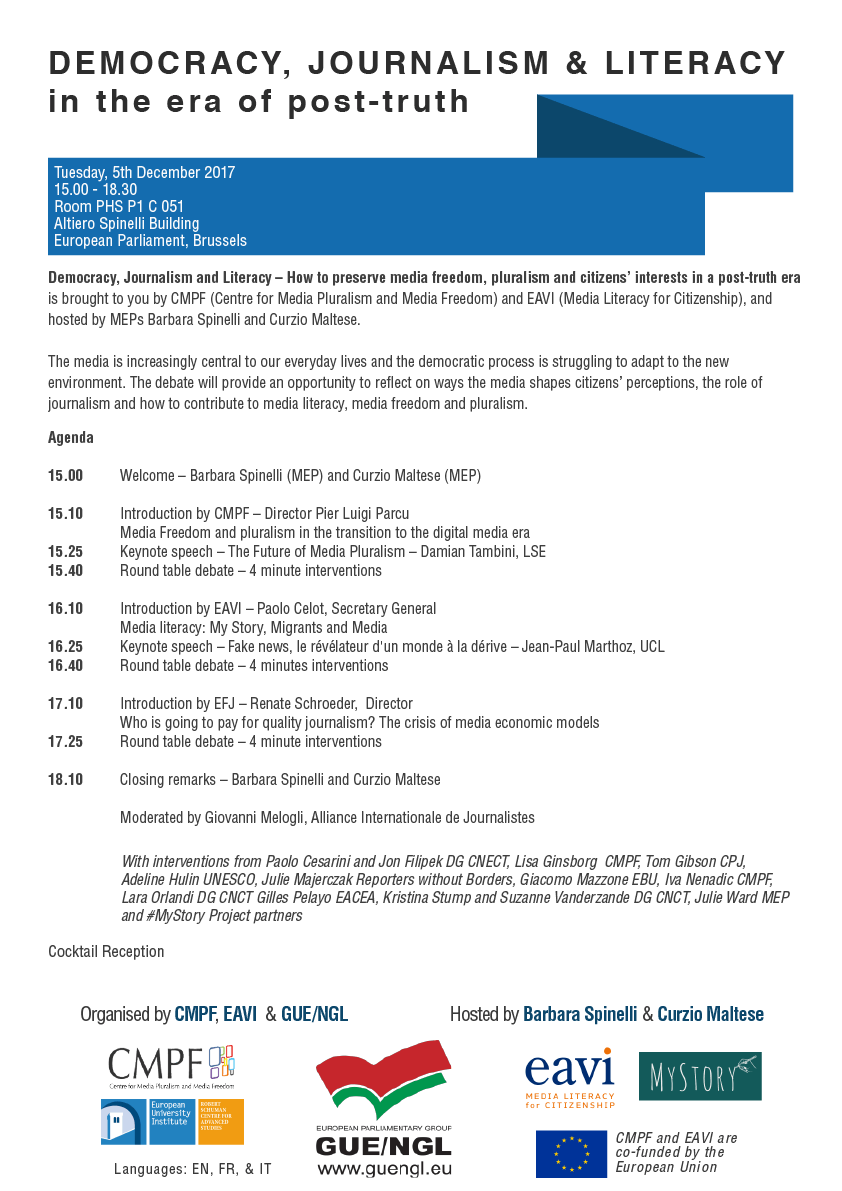Rue Wiertz 60
1047 Bruxelles
Belgium

The roundtable, Democracy, Journalism & Literacy in the era of post-truth is organised by CMPF (the Centre for Media Pluralism and Media Freedom) and EAVI (the European Association for Viewers Interests), hosted by MEPs Barbara Spinelli and Curzio Maltese.
Freedom of expression and freedom and pluralism of the media are fundamental rights and principles enshrined in the Charter of Fundamental Rights of the European Union. Media pluralism and media freedom are essential to guarantee a democratic environment for all EU citizens and constitute the foundations of any healthy democratic society: they are conditions to guarantee that individuals have access to a variety of information and may form their opinions by taking into account different perspectives and points of view. Internet, the World Wide Web and Social Media have enhanced the opportunities for citizens to contribute to the public discourse.
Within this evolving media landscape, web platforms, mobile applications and digital devices are increasingly affecting the creation, dissemination and consumption of news and other information. While these technologies offer plentiful opportunities for citizens to be informed and actively participate in the public debate, it is also the primary vehicle for the massive diffusion and amplification of dis-information and other harmful or potentially deceiving content.
Click here to register for the event.
The event will focus on three interrelated topics.
First, it will discuss the evolving concept of media freedom and media pluralism in the digital media landscape, the possible new parameters to measure the risks that freedom of expression, pluralism and, in the end, democracy may face in the online environment. While thinking of regulatory solutions to growing dis- and mis-information online is challenging and risky, new policy instruments should be studies to tackle these phenomena (i.e. an independent monitoring of risks posed to freedom of expression and pluralism online, exploiting the methodology of the Media Pluralism Monitor, carried out by the CMPF).
One response to the growing challenges brought by dis- and mis- information online is media literacy. Thus, the second part of the event will reflect on the importance of developing a common understanding and measures to increase media literacy as a set of skills to empower people to produce content and to critically think about information that is being served to them. The content and results of #MyStory – the EAVI project designed to employ media literacy competencies to create counter-narratives to mainstream media discourse on migrants and refugees – will be presented.
The role of professional journalists in separating facts from fiction and to provide information of public interest is today more indispensable than ever. However, due to the crisis of traditional media economic models and increasingly precarious working conditions of journalists, quality journalism is at stake. The final part of the event will concentrate on these issues and possible sustainable industrial and policy solutions.
The overall aim of the event is to inform the debate and call for action, including policies at EU level, to study, understand and protect necessary conditions for freedom of expression, pluralism and, in the end for a healthy democracy in the so called era of “post-truth”.
Click the image below for the pdf version.

